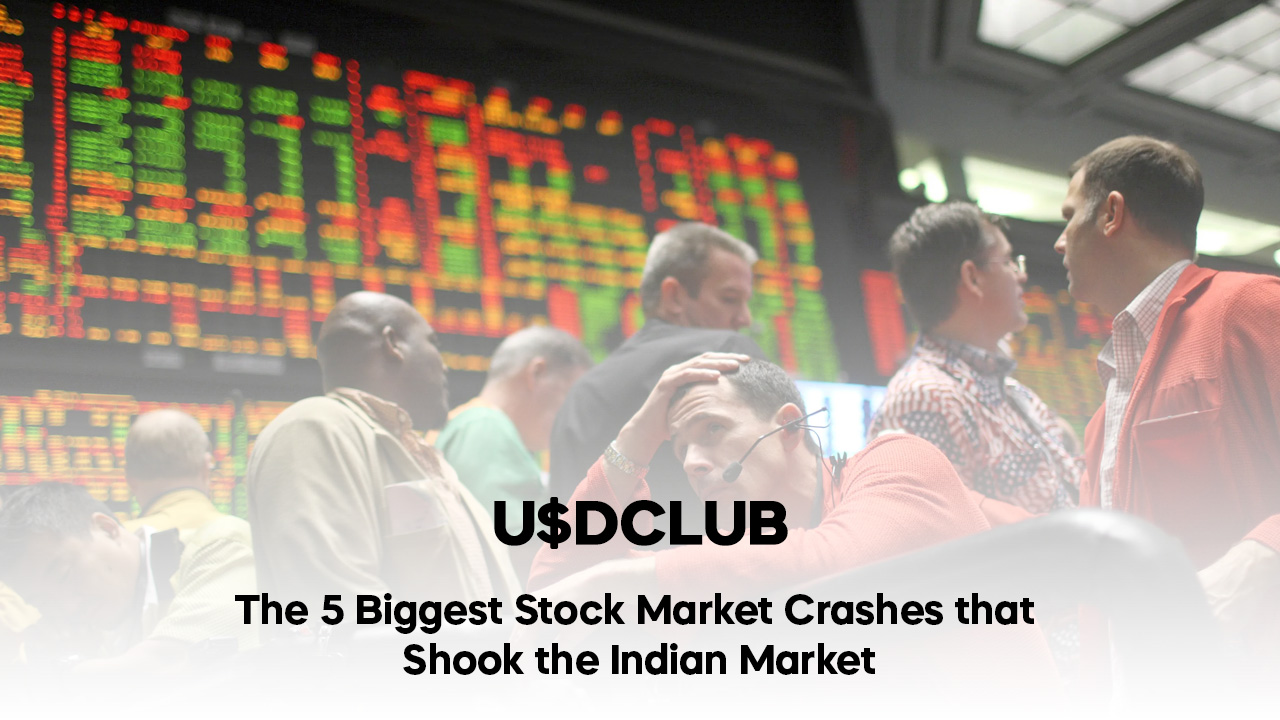The Indian stock market has witnessed several major crashes over the decades, each leaving a significant impact on the country’s economy, investors, and businesses. While stock markets are inherently volatile, some events are so catastrophic that they trigger massive sell-offs, leaving a lasting mark. In this blog, we’ll discuss five of the biggest stock market crashes in Indian history, examining their causes, effects, and long-term implications.
-
The Harshad Mehta Scam (1992)
The *Harshad Mehta Scam* is arguably the most infamous financial scandal in Indian history, and it triggered a stock market crash that left a deep scar on the Indian economy. Harshad Mehta, often referred to as the “Big Bull” of Dalal Street, used fraudulent means to manipulate stock prices, causing an artificial surge in the stock market.
What Happened?
Mehta used a loophole in the banking system to divert funds into the stock market, inflating the prices of certain stocks, particularly those of *ACC, **Reliance, and **Tata Steel. At the height of the scam, the **Sensex* soared from 1,000 points to nearly 4,500 points. However, once the fraud was exposed in April 1992, the market collapsed.
– Impact on the Market: The Sensex fell by **12.77%* in a single day, and over the next few days, the market lost up to *40%* of its value.
– Investor Losses: Investors withdrew *$420 million** from the market in a panic, and the Indian stock market was left in shambles.
Long-Term Implications
The Harshad Mehta Scam led to widespread reforms in India’s stock market. The *Securities and Exchange Board of India (SEBI)* was empowered to regulate the market more effectively, and the stock market was gradually modernized to prevent such scams in the future. Despite the reforms, the event continues to serve as a cautionary tale about market manipulation and fraud.
-
The US Financial Crisis (2008)
The *US Financial Crisis* of 2008, also known as the *Global Financial Crisis*, sent shockwaves across the world, and India was no exception. Triggered by the collapse of Lehman Brothers and the subsequent unraveling of the global financial system, the crisis led to a major crash in the Indian stock market.
What Happened?
On *17th March 2008, the **Sensex* plunged by *950 points* in a single day. Over the next few months, the Sensex fell by over *15,000 points*, wiping out billions of dollars in investor wealth.
– Impact on the Market: In the fiscal year **2008-09, the Indian stock market fell by **50%* from its all-time high, with sectors like real estate, banking, and infrastructure hit the hardest.
– Investor Panic: Foreign investors began pulling out money from the Indian markets, causing a ripple effect that lasted for several months.
Long-Term Implications
The 2008 crash taught Indian investors the importance of global economic interconnectivity. While India was not directly responsible for the crisis, the country’s economy was deeply affected by the global downturn. After the crisis, Indian regulators strengthened risk management practices for financial institutions, and there was a greater emphasis on maintaining foreign exchange reserves to cushion the economy during global shocks.
-
Demonetization (2016)
In November 2016, *demonetization* took the Indian economy by surprise. The government announced that *Rs 500* and *Rs 1,000* currency notes would no longer be legal tender, in a bid to curb black money and counterfeit currency. This unexpected move sent ripples through the stock market, leading to one of the sharpest single-day declines in recent history.
What Happened?
On *8th November 2016, as soon as the demonetization announcement was made, uncertainty gripped the market. At the same time, **Donald Trump* was elected as the *President of the United States*, adding further uncertainty to global markets.
– Impact on the Market: The **Sensex* fell by *1,688 points, and the **Nifty* dropped by *540 points* within a few days of the announcement. The combination of demonetization and the U.S. elections created a sense of panic among investors.
– Investor Reaction: Both domestic and foreign investors reacted to the uncertainty by selling off their stocks, leading to a temporary decline in market value.
Long-Term Implications
Demonetization had a profound impact on the Indian economy. While it led to short-term disruptions in cash flow and business activities, the stock market eventually stabilized as investors adjusted to the new monetary environment. The real estate and small business sectors suffered the most during this period, but over time, the market regained its footing, and the Sensex climbed to new highs.
-
Yuan Devaluation and Global Sell-Off (2015)
In *August 2015, a series of global economic events combined to create a major sell-off in the Indian stock market. The trigger for this crash was the **devaluation of the Chinese yuan, coupled with other global issues like declining **oil prices, negative **GDP news* from China, and concerns over *Brexit*.
What Happened?
On *24th August 2015, also known as **Black Monday*, the Sensex saw a massive sell-off. The Chinese economy, which was showing signs of weakness, announced a devaluation of its currency, leading to fears of a global economic slowdown.
– Impact on the Market: The Sensex fell by **5.94%* in a single day, wiping out more than *7 lakh crore rupees* from the Indian market.
– Investor Reaction: This was one of the largest single-day falls in Indian stock market history, with panic selling by both domestic and foreign investors. Global markets were also in turmoil, leading to heightened volatility.
Long-Term Implications
The 2015 crash was a wake-up call for Indian investors about the risks posed by global events. The Indian economy had limited exposure to China’s problems, but the global interconnectedness of financial markets meant that Indian stocks suffered nonetheless. This crash underscored the importance of diversification and the need for Indian investors to remain vigilant about global developments.
-
COVID-19 Pandemic (2020)
The *COVID-19 pandemic* has been one of the most unprecedented events in recent history, and its impact on the global economy was both swift and severe. The pandemic-induced lockdowns, uncertainty, and fear of a global recession led to one of the steepest declines in stock market history.
What Happened?
As the coronavirus began spreading across the world, governments imposed lockdowns, halting business activities and creating economic uncertainty. In March 2020, the Indian stock market experienced its worst crash in decades.
– Impact on the Market: On **23rd March 2020, the **Sensex* fell by *3,935 points* in a single day, marking one of the largest single-day losses in Indian stock market history. The market lost *13.88 trillion rupees* in value during this period.
– Investor Panic: Investors were gripped by fear, and massive selling ensued. Both retail and institutional investors pulled out of the market, fearing a prolonged economic downturn.
Long-Term Implications
While the initial reaction to the pandemic was extreme, the Indian stock market made an astonishing recovery in the months that followed. As governments rolled out stimulus packages and central banks cut interest rates, investors regained confidence, and the market climbed to new highs by the end of 2020.
The pandemic crash also led to the acceleration of digital transformation across industries, with sectors like e-commerce, technology, and pharmaceuticals seeing significant growth. This crisis highlighted the resilience of the Indian stock market and its ability to bounce back from global shocks.
Conclusion
Each of these five stock market crashes—whether caused by fraud, global financial crises, or unexpected government actions—left a profound impact on India’s economy and investors. However, they also serve as valuable lessons in resilience and recovery. The Indian stock market has repeatedly shown its ability to bounce back, often emerging stronger from each crisis.
For investors, these events underscore the importance of maintaining a long-term perspective, diversifying portfolios, and staying informed about both domestic and global developments. While stock market crashes can be terrifying in the moment, they are also opportunities for those who are patient and well-prepared.
As always, investors must stay informed about both global and domestic events that influence the stock market. For more updates on market developments, *follow* and *stay tuned to USDCLUB.us* for insightful news on IPOs, stocks, and investment strategies.







